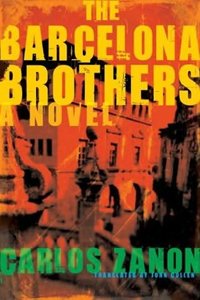
In a fit of jealousy and inadequacy, Epi Dalmau hammers his friend, the Morrocan Tanveer, to death in a bar. His brother Alex is witness to the murder, but Epi runs away from the scene before they have a chance to cover their tracks. Alex and the barman agree to protect Epi, and allow the blame to fall on a Pakistani man who wandered in to use the toilet. Meanwhile, Epi is searching for the love of his life, Tiffany, who has blue-tattooed eyelids, a young son and her own desperate compulsion to fight and make up with Tanveer. She is the real reason behind the crime. The rest of the novel is a gritty romp through the sordid streets of a poverty-stricken barrio of Barcelona. The upwardly mobile or aspiring families have long since moved out, leaving behind the physically impaired, the poor, junkies and drunks.
Expect to be unsettled when you read this story. With its almost unbearably graphic descriptions of violence, fears and hopelessness, this is an unflinching portrayal of a society on the brink of collapse. It is not just Epi, the murderer, who seems incapable of functioning normally in society. None of the other main characters are completely stable, reliable or sympathetic. The victim, Tanveer, was a brutal rapist, Tiffany a manipulative whore, and Alex is a borderline schizophrenic on medication. However, we are drawn into their stories and into their relentlessly drab existence because the author can show them to us in all their human frailty. These are vulnerable people with scarcely articulated hopes and dreams, and they have been badly let down by their families, and society. Yet Zanón is completely unsentimental in describing the selfish motivations of the protagonists.
This novel will appeal to the readers who enjoyed Out by Natsuo Kirino. There too we have violence, graphic descriptions, deadening of expectations, and solidarity turning to egoism. There too we see almost unbearably dreary lives pushing people to do extraordinarily nasty things. Whether it’s Tokyo or Barcelona, poverty and desperation smell much the same everywhere. The final point of similarity is that in both books we know the killer from the very outset. The reason why we want to keep on reading is to see if the killer gets caught, and if the people who attempt to cover up the crime get punished.
Carlos Zanón has previously published four volumes of poetry and his mastery of language and atmosphere is apparent even in translation. The dialogue is spot-on, the descriptions are confident, even lyrical at times, and it manages to skim the edges of pulp territory while never getting too lurid. The Barcelona Brothers takes a long, hard look at what people are capable of when they have no other options, and a portrait of a modern, multicultural Barcelona, with all the tensions simmering under the touristy surface. If you are in the mood for a darker than average holiday read, this is the book for you.
The Barcelona Brothers is released in the UK on 28 August 2012.
Other Press
Print
£9.19
CFL Rating: 4 Stars